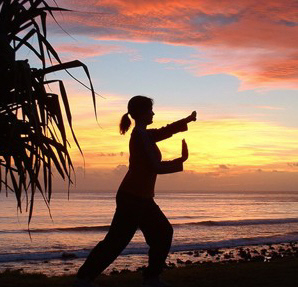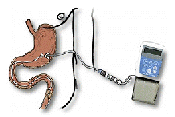 People with Parkinson's Disease tend to have impaired balance, and an increased risk of falling. A clinical trial assessed the effect of Tai Chi on postural control in Parkinson's Disease. Tai Chi is a traditional Chinese martial art and form of exercise. For more information go to Tai Chi. Participants took part in 60-minute exercise sessions twice weekly for 24 weeks. Although the researchers claimed that Tai Chi performed consistently better than other methods, the improvement was only 5% better than resistance training, and 12% better than stretching exercises. The Tai Chi group performed better than the stretching group in all secondary outcomes and outperformed the resistance-training group in stride length and functional reach. Tai Chi lowered the incidence of falls when compared with stretching exercises but not when compared with resistance training.
People with Parkinson's Disease tend to have impaired balance, and an increased risk of falling. A clinical trial assessed the effect of Tai Chi on postural control in Parkinson's Disease. Tai Chi is a traditional Chinese martial art and form of exercise. For more information go to Tai Chi. Participants took part in 60-minute exercise sessions twice weekly for 24 weeks. Although the researchers claimed that Tai Chi performed consistently better than other methods, the improvement was only 5% better than resistance training, and 12% better than stretching exercises. The Tai Chi group performed better than the stretching group in all secondary outcomes and outperformed the resistance-training group in stride length and functional reach. Tai Chi lowered the incidence of falls when compared with stretching exercises but not when compared with resistance training. WELCOME TO OUR PARKINSON'S PLACE!
I HAVE PARKINSON'S DISEASES AND THOUGHT IT WOULD BE NICE TO HAVE A PLACE WHERE THE CONTENTS OF UPDATED NEWS IS FOUND IN ONE PLACE. THAT IS WHY I BEGAN THIS BLOG.
I COPY NEWS ARTICLES PERTAINING TO RESEARCH, NEWS AND INFORMATION FOR PARKINSON'S DISEASE, DEMENTIA, THE BRAIN, DEPRESSION AND PARKINSON'S WITH DYSTONIA. I ALSO POST ABOUT FUNDRAISING FOR PARKINSON'S DISEASE AND EVENTS. I TRY TO BE UP-TO-DATE AS POSSIBLE.
I AM NOT RESPONSIBLE FOR IT'S CONTENTS. I AM JUST A COPIER OF INFORMATION SEARCHED ON THE COMPUTER. PLEASE UNDERSTAND THE COPIES ARE JUST THAT, COPIES AND AT TIMES, I AM UNABLE TO ENLARGE THE WORDING OR KEEP IT UNIFORMED AS I WISH. IT IS IMPORTANT TO UNDERSTAND I AM A PERSON WITH PARKINSON'S DISEASE. I HAVE NO MEDICAL EDUCATION,
I JUST WANT TO SHARE WITH YOU WHAT I READ ON THE INTERNET. IT IS UP TO YOU TO DECIDE WHETHER TO READ IT AND TALK IT OVER WITH YOUR DOCTOR. I AM JUST THE COPIER OF DOCUMENTS FROM THE COMPUTER. I DO NOT HAVE PROOF OF FACT OR FICTION OF THE ARTICLE. I ALSO TRY TO PLACE A LINK AT THE BOTTOM OF EACH ARTICLE TO SHOW WHERE I RECEIVED THE INFORMATION SO THAT YOU MAY WANT TO VISIT THEIR SITE.
THIS IS FOR YOU TO READ AND TO ALWAYS KEEP AN OPEN MIND.
PLEASE DISCUSS THIS WITH YOUR DOCTOR, SHOULD YOU HAVE ANY QUESTIONS, OR CONCERNS. NEVER DO ANYTHING WITHOUT TALKING TO YOUR DOCTOR FIRST..
I DO NOT MAKE ANY MONEY FROM THIS WEBSITE. I VOLUNTEER MY TIME TO HELP ALL OF US TO BE INFORMED.
I WILL NOT ACCEPT ANY ADVERTISEMENT OR HEALING POWERS, HEALING FROM HERBS AND ETC. UNLESS IT HAS GONE THROUGH TRIALS AND APPROVED BY FDA. IT WILL GO INTO SPAM.
THIS IS A FREE SITE FOR ALL WITH NO ADVERTISEMENTS
THANK YOU FOR VISITING! TOGETHER WE CAN MAKE A DIFFERENCE!
TRANSLATE
Sunday, February 12, 2012
THE EFFECT OF TAI CHI ON PARKINSON'S DISEASE
 People with Parkinson's Disease tend to have impaired balance, and an increased risk of falling. A clinical trial assessed the effect of Tai Chi on postural control in Parkinson's Disease. Tai Chi is a traditional Chinese martial art and form of exercise. For more information go to Tai Chi. Participants took part in 60-minute exercise sessions twice weekly for 24 weeks. Although the researchers claimed that Tai Chi performed consistently better than other methods, the improvement was only 5% better than resistance training, and 12% better than stretching exercises. The Tai Chi group performed better than the stretching group in all secondary outcomes and outperformed the resistance-training group in stride length and functional reach. Tai Chi lowered the incidence of falls when compared with stretching exercises but not when compared with resistance training.
People with Parkinson's Disease tend to have impaired balance, and an increased risk of falling. A clinical trial assessed the effect of Tai Chi on postural control in Parkinson's Disease. Tai Chi is a traditional Chinese martial art and form of exercise. For more information go to Tai Chi. Participants took part in 60-minute exercise sessions twice weekly for 24 weeks. Although the researchers claimed that Tai Chi performed consistently better than other methods, the improvement was only 5% better than resistance training, and 12% better than stretching exercises. The Tai Chi group performed better than the stretching group in all secondary outcomes and outperformed the resistance-training group in stride length and functional reach. Tai Chi lowered the incidence of falls when compared with stretching exercises but not when compared with resistance training. DUODENAL L-DOPA CAN CAUSE POLYNEUROPATHY
Journal of Neurology [2012] Jan 24 [Epub ahead of print] (Santos-García D, de la Fuente-Fernández R, Valldeoriola F, Palasí A, Carrillo F, Grande M, Mir P, De Fabregues O, Casanova J.)
 Reports have emerged describing the occurrence of polyneuropathy related to vitamin B12 deficiency and Guillain-Barré syndrome in people with Parkinson's Disease who are being treated with continuous duodenal L-dopa infusion. Duodenal L-dopa is administered as a gel throughout the day using a portable pump directly into the small intestine through a surgically placed tube. This ensures a flow of L-dopa that can be adjusted according to the patient's individual needs.
Reports have emerged describing the occurrence of polyneuropathy related to vitamin B12 deficiency and Guillain-Barré syndrome in people with Parkinson's Disease who are being treated with continuous duodenal L-dopa infusion. Duodenal L-dopa is administered as a gel throughout the day using a portable pump directly into the small intestine through a surgically placed tube. This ensures a flow of L-dopa that can be adjusted according to the patient's individual needs.